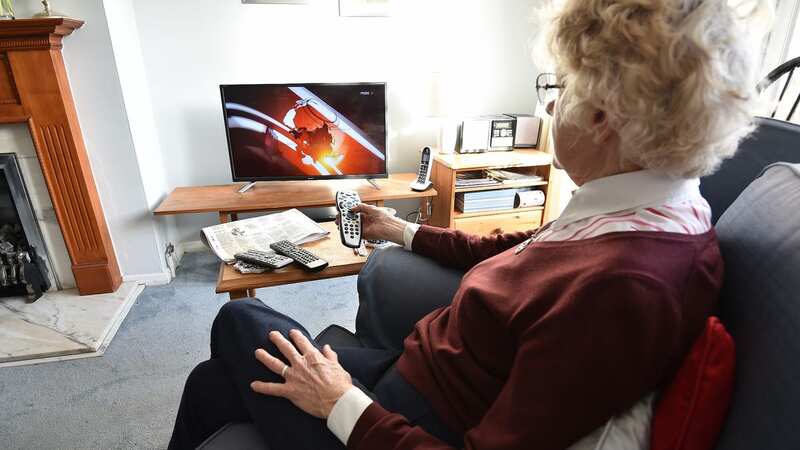TV licence fee hike to £173 in doubt as Rishi Sunak warns BBC to be 'realistic'

Rishi Sunak has warned the BBC must be "realistic" over how much it expects people to pay for the licence fee as he welcomed cuts at the broadcaster.
The Prime Minister said the corporation needs to look at easing the cost of living on families and must "cut its cloth appropriately". Mr Sunak signalled his concern over a looming rise to the £159-a-year payment, which is expected to go up in April when the current freeze lifts.
It could rise by nearly £15 to £173.30-a-year - the biggest hike since 1985. The increase has not been confirmed but the broadcaster has previously agreed to rises in line with inflation.
It comes as the BBC seeks to make £500 million of savings, with huge cuts to its flagship Newsnight programme in recent days. The BBC2 show is set to be shorter, with its 57-strong workforce reduced to 23 in a move expected to save £7.5million.
Speaking on the way to the COP28 summit in Dubai, Mr Sunak said: "First thing to say is, I think it is welcome that the BBC are looking at making savings and efficiencies in how they operate. It's really important that when things are difficult everyone is doing what they can to ease the cost of living on families. That's certainly what I have done over the last year and made a bunch of decisions that haven't been easy."
 Teachers, civil servants and train drivers walk out in biggest strike in decade
Teachers, civil servants and train drivers walk out in biggest strike in decade
Asked how sustainable the licence fee is, given that critics are calling for it to be overhauled, the PM said: "The BBC like any other organisation that serves the public should be looking to cut its cloth appropriately so I think that is very welcome. I think going forward, final decisions haven't been obviously - but the BBC should be realistic about what it can expect people to pay at a time like this. That, I think is the right approach."
Should the BBC licence fee be scrapped? Vote in our poll HERE to have your say.
Today, Culture Secretary Lucy Frazer today said a £15 rise would be "high" as speculation mounted that Mr Sunak could block the 9% rise. She told Times Radio: "What that means is that we're in a position where people are struggling with the cost of living. And as a Government, we tried very hard to make sure that those costs are low. And the licence fee is due to rise, although we froze it for two years.
"But as it rises, the BBC needs to be realistic about how much it can rise by. We want to make sure we protect licence fee payers and make sure that it just rises at an amount that people can afford."
Asked about a rise to over £170, she said: "Well, obviously, that's high. This is something that we're looking at, at the moment. And we'll be making a decision on this in due course."
A BBC spokesperson said: "The Government and BBC agreed a six-year licence fee settlement in January 2022, which froze the licence fee for two years with increases in line with inflation from 2024.
"As is usual practice the Government sets and confirms the cost of a licence each year and this remains unconfirmed for 2024/25. "The BBC will continue to focus on what it does best: working to deliver world-class content and providing great value for all audiences."
The existence of the licence fee is only guaranteed until the end of 2027, when the BBC Charter is up for renewal. Mr Sunak's comments also raises the possibility that the licence fee will be scrapped altogether, forcing it to raise funds in other ways.
Last year, the then-Culture Secretary Nadine Dorries announced that the licence fee would be frozen for three years. She claimed it would be the end of the existing model for the BBC, raising doubts about how it will be funded after 2027.
Ms Dorries said at the time: “The days of the elderly being threatened with prison sentences and bailiffs knocking on doors are over. Time now to discuss and debate new ways of funding, supporting and selling great British content.”
 Richard 'shuts up' GMB guest who says Hancock 'deserved' being called 'd***head'
Richard 'shuts up' GMB guest who says Hancock 'deserved' being called 'd***head'
It is unclear how this could work - with the possibility of the BBC becoming a subscription service, privatised or Government-funded. The Government has been criticised for its handling of relations with the national broadcaster.
In April former chairman Richard Sharp announced he was resigning after failing to declare he'd helped Boris Johnson secure an £800,000 loan. A scathing report found there was a “potential perceived conflict of interest”.
* Follow Mirror Politics on Snapchat, Tiktok, Twitter and Facebook
Read more similar news:
Comments:
comments powered by Disqus

































